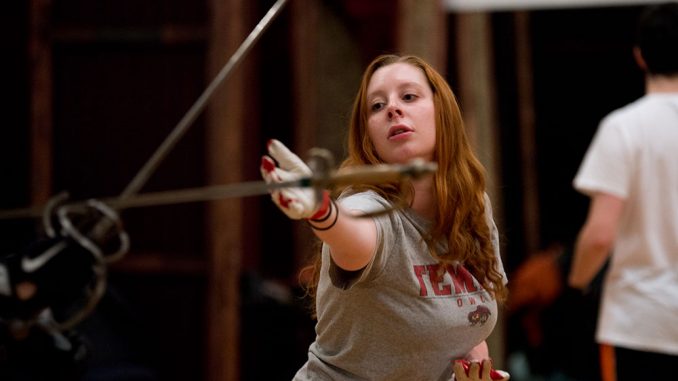
Tyler Dougherty signed up for a class called Swordplay for the Actor expecting to share a couple laughs with his friend and maybe break a sweat.
However, the 2013 Temple graduate quickly realized Daniel Rose’s class, which trains actors in swordplay for the stage, was no joke.
“It’s not an acting class,” Dougherty said. “It’s staged combat with small, one-handed swords.”
His friend Chris Boon compared the physicality to a gym class.
“We didn’t study or read books,” Boon, a fellow 2013 Temple grad, said. “We stretched for the first 30 minutes each class and then performed warm-up drills.”
Rose provides the swords, but said the students must bring their respect for the art of wielding them.
“It’s what we in the business call single-sword,” Rose said. “Basically the methods of Errol Flynn and Douglas Fairbanks Jr., but for the kids, think ‘Pirates of the Caribbean’ kind of fighting. I drill students pretty hard because what you do in rehearsal, you’ll do in performance.”
As a certified instructor and fight director with Fight Directors Canada and Society of American Fight Directors, Rose has been organizing swordfights in the tristate area for 15 years and teaching at Temple for
seven.
“I started as an actor at Western Illinois University,” Rose said. “I participated in the Society of American Fight Directors’ first ever national workshop. I’ve been hooked ever since.”
Boon advises students to develop their discipline in Rose’s class, with the expectation being that they consider the knowledge they will gain to be a necessary part of their acting skillset.
“Daniel Rose goes by Ian, but some students call him coach,” Boon said. “You have to be very open-minded in that class. You can’t half-ass it or he’ll call you out right away.”
Dougherty said the class was unlike anything he had experienced at Temple.
“We actually watched sword fighting scenes from movies,” Dougherty said. “Then we would incorporate dialogue from the fights. We also learned each part of the sword and the different maneuvers.”
Although Rose instructs students to prepare for staged duels, he said students are truly learning proper sword fighting style.
“Students learn things that are good for really fighting with a sword because you have to teach both styles,” Rose said. “The blocks you do are real blocks, the avoidance, the footwork, the point work techniques. We cut for stage, but carry for real. The attacks are only stopped so you don’t put your partner in danger. The whole point is that you have to be able to walk away every day from this class unharmed.”
The class is focused, students said, because Rose doesn’t give any opportunities to belittle the subject matter – the training is strategically organized so students break bad habits. Despite displaying chemistry during their performances, Dougherty and Boon’s roughhouse antics didn’t sit well with their instructor.
“Since [Dougherty] and I have been friends for so long, we figured if we hit each other it’s not a big deal,” Boon said. “Well, Rose didn’t appreciate that approach and separated us so we could adapt to different styles of different partners. I had a really timid kid to work with so I would slow down and work on my technique.”
Dougherty’s new cohort couldn’t have been more different from his longtime friend Boon.
“I worked with a woman so I would calm down,” Dougherty said. “Obviously, I didn’t want to hit her. And I was the only left-handed person in there so everything I did was backwards.”
While rapid movements might not appeal to most students twice a week at 8 a.m., Rose said he believes the early morning sacrifice pays off in the long run.
“Even if you don’t feel like you’re learning a lot about theater, you’re learning about balance, centering, control and all kinds of good things for your body and mind,” Rose said. “They call fencing ‘physical chess,’ and to a certain extent, this is as well. If you think acting isn’t physical, you’re mistaken.”
John Corrigan can be reached at john.corrigan@temple.edu.



Be the first to comment